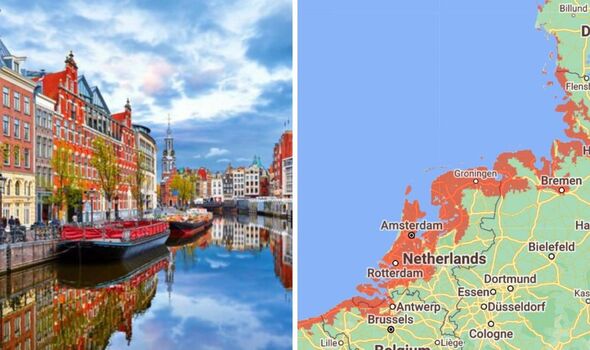Shocking maps have revealed an array of famous European cities that could all be underwater by 2050.
An interactive map has revealed scores of our most-loved coastal resorts, towns and cities that could be engulfed by waves in just a couple of decades to come due to climate change.
Express.co.uk has reported extensively on the crisis that could completely submerge places in the UK if action is not taken. Now we are shining light on some of the continent’s most stunning cities that could also be drowned out.
Produced by Climate Central – a US-based non-profit researching the impacts of global warming – shows places projected to be below the annual flood level in 2050.
The locations that glow bright red on the map include towns Hull, Doncaster and a big chunk out of the coastline with a huge amount of beach side locations including Skegness and reaching all the way inland to Lincoln. On the other side of the country Blackpool, Southport and the coast near Liverpool are affected. You can read a fuller picture of how the UK will be affected here.
Just across in mainland Europe, coastal areas predicted to be underwater include Calais and Dunkirk in France. Further up the coast in Belgium, Bruges, Ghent and Antwerp are included.
Meanwhile, larger cities in the Netherlands depicted in crimson on the map are Rotterdam, The Hague and Amsterdam while larger cities in Germany include Oldenburg, Bremen and Hamburg.
Climate Central’s map explains more about its predictions which it says are based on “peer-reviewed” science.
It said: “Climate Central’s sea level rise and coastal flood maps are based on peer-reviewed science in leading journals.
“As these maps incorporate big datasets, which always include some error, these maps should be regarded as screening tools to identify places that may require deeper investigation of risk.”
It added: “Our approach makes it easy to map any scenario quickly and reflects threats from permanent future sea-level rise well.”
Nearly 5,000 flood alerts were issued across Britain between January and April this year, statistics obtained through the Freedom of Information Act by Round Our Way found.
Roger Harding, director of the non-profit organisation, said: “In the past flooding was a rarity for most of us. We were more likely to see it on the TV than with our own eyes, but recently things have changed.
“Barely a winter week seems to pass without a weather warning being issued and the floods that come in their wake.
“These figures back up what many of us are thinking, as climate change sets in, more floods are happening. The first four months of this year saw the highest number of flood warnings since records began.”
